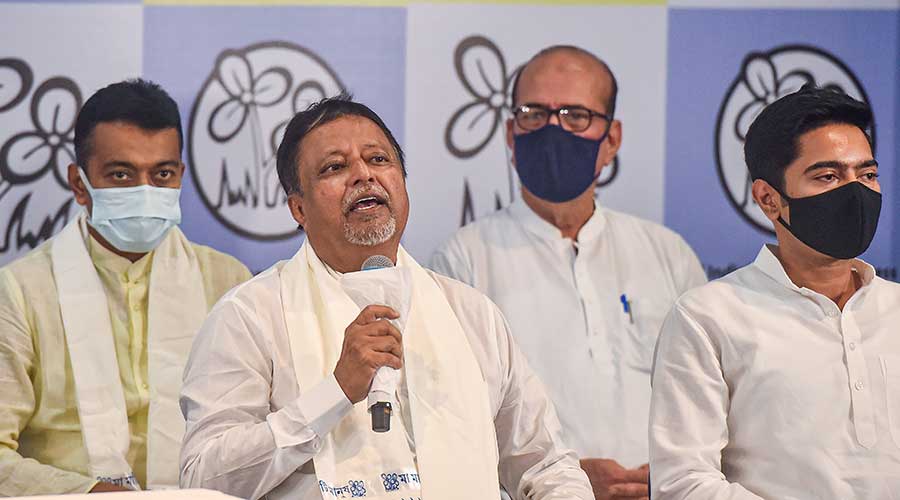Sir — The political culture of defection and horse trading has now become common in Bengal, indeed in all of India. The senior politician, Mukul Roy, recently switched back to his old party, the Trinamul Congress, after hobnobbing with heavyweights of the Bharatiya Janata Party as national vice-president for 1,316 days — he even won from the Krishnanagar seat as a BJP candidate (“Prodigal sons”, June 13). Roy must have sensed that the threats posed by the Central investigation teams in the Narada case have passed.
After rejoining the TMC, Roy expressed his happiness at being among familiar faces. He was also given a warm hug by Abhishek Banerjee, who was considered to be his rival. Roy has also secured the future of his son, Subhranshu Roy — who lost this time to a TMC candidate — at the party.
The electorate of West Bengal handed over a sweeping victory to Mamata Banerjee. She happened to be the star campaigner with an injured leg, standing up against hordes of Central ministers. What is the use of inducting these opportunists now, going against the choice of the voters? This shows that political ideology is for the ground-level workers while leaders in the higher echelons are free to change parties. People like Roy have not borne the brunt of the post-poll violence. They should take initiative to rehabilitate and compensate party workers or their families who have been rendered homeless or lost lives in the aftermath of the elections, irrespective of party colour, to restore the people’s trust in politicians and politics. Banerjee had declared a cleaning of the Augean stable when certain leaders left the party; it is unfortunate that the party seems ready to take them back.
Subhankar Mukherjee,
Calcutta
Sir — Dealing a major blow to the BJP, Mukul Roy, hitherto the party’s national vice-president and one of the key faces in Bengal, has returned to the TMC, along with his son. In spite of the attempts of the BJP state president, Dilip Ghosh, and some other leaders to discredit Roy by claiming that losing him did not make any difference to the party’s prospects in Bengal, it is clear that the BJP is just trying to save face. Otherwise, how could they ignore the fact that Roy was instrumental in the BJP’s hopes for a political coup in Bengal in 2017. He was considered crucial in the 2019 elections too.
But what changed when it came to the state elections? The answer lies in the tact of the BJP’s Central leadership. In the hope of dethroning Mamata Banerjee, the BJP leadership gave more importance to the new turncoat from the TMC, Suvendu Adhikari, since his joining at the end of 2020. It seemed to have forgotten Roy, who helped the party expand its organizational base to the grass roots of the state and build booth committees. His efforts ensured that the BJP performed well in the 2018 panchayat elections, inspiring him to strengthen the party before the 2019 Lok Sabha elections. His tireless work paid rich dividends and the BJP won 18 of the 42 seats in Bengal, and increased its vote share from 10.16 per cent in the 2016 Assembly polls to 40.3 per cent.
Banerjee opened the doors of her party to Roy, now isolated in the BJP, allegedly because he was ‘never a traitor like the others’. This claim is a matter of debate just like the reported remark by Roy that the BJP’s stress on communalism irked him. If that was the case, how could he stay in the party for nearly four years?
Roy seems to be Banerjee’s first target among legislators she plans to bring back from the BJP, including those who switched just before the assembly elections. This appears to be part of the TMC’s planning for 2024. A few months ago, BJP leaders said that TMC will have no existence after the 2021 assembly elections. But with several turncoats reportedly in line to return, the situation seems to be the other way round. But since Roy was thus far in the BJP, he had not been arrested in spite of alleged involvement in scams. Roy should now be ready to face the music. After all, this is how Indian politics works.
Bidyut Kumar Chatterjee,
Faridabad
Move forward
Sir — In a historic victory for animal rights activists, Israel has become the first country to ban the sale of animal fur in the fashion industry. An exemption will however be made for ultra-Orthodox Jewish men whose ‘shtreimels’ are made of fur. According to some estimates, about 100 million animals are bred and killed each year to supply fur to the fashion sector. This is utterly unreasonable, given that faux fur can easily be used in place of animal fur. One also hopes that the political changes in Israel do not affect the country’s decision in this regard. Other countries should follow suit.
Bidisha Pal,
Calcutta










